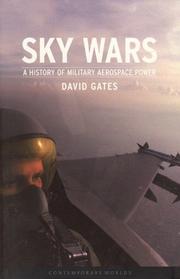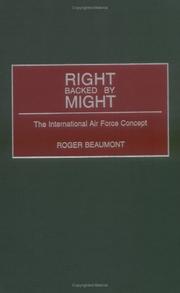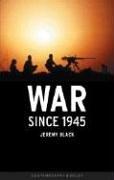| Listing 1 - 10 of 712 | << page >> |
Sort by
|
Book
ISBN: 0333470540 Year: 1988 Publisher: Houndmills, UK : MacMillan,
Abstract | Keywords | Export | Availability | Bookmark
 Loading...
Loading...Choose an application
- Reference Manager
- EndNote
- RefWorks (Direct export to RefWorks)
Book
Year: 2017 Publisher: FedOA - Federico II University Press
Abstract | Keywords | Export | Availability | Bookmark
 Loading...
Loading...Choose an application
- Reference Manager
- EndNote
- RefWorks (Direct export to RefWorks)
During the First World War, the parliaments of the states involved in the conflict were, in most cases, forced to drastically limit their activity and were often precluded the possibility of fully exercising their prerogatives. More generally the spaces of freedom granted to the citizens, of which the parliamentary institution was the brightest symbol, shrank dramatically. At the same time, the power of military commands expanded, not only in trenches and on battlefields, but also in many areas of civilian life. However, in the final years of the war, the Parliaments succeeded not only in gradually regaining control, but also in pushing for an extension of their functions, initiating a process that in many states coincided with the transition from a liberal order to a full democratic order. The years of the "long" postwar period were however dense with contradictions. Legislative and executive law often grew together, while in some cases the imperative logic imposed for a long time in wartime re-emerged and consolidated. This volume, which examines several national cases, illustrates some of the ambivalent features of this dramatic phase of European history.
Military Power --- Welfare State --- First World War --- Parliaments --- Royal Prerogative
Book
Year: 2017 Publisher: FedOA - Federico II University Press
Abstract | Keywords | Export | Availability | Bookmark
 Loading...
Loading...Choose an application
- Reference Manager
- EndNote
- RefWorks (Direct export to RefWorks)
During the First World War, the parliaments of the states involved in the conflict were, in most cases, forced to drastically limit their activity and were often precluded the possibility of fully exercising their prerogatives. More generally the spaces of freedom granted to the citizens, of which the parliamentary institution was the brightest symbol, shrank dramatically. At the same time, the power of military commands expanded, not only in trenches and on battlefields, but also in many areas of civilian life. However, in the final years of the war, the Parliaments succeeded not only in gradually regaining control, but also in pushing for an extension of their functions, initiating a process that in many states coincided with the transition from a liberal order to a full democratic order. The years of the "long" postwar period were however dense with contradictions. Legislative and executive law often grew together, while in some cases the imperative logic imposed for a long time in wartime re-emerged and consolidated. This volume, which examines several national cases, illustrates some of the ambivalent features of this dramatic phase of European history.
Military Power --- Welfare State --- First World War --- Parliaments --- Royal Prerogative
Book
Year: 2017 Publisher: FedOA - Federico II University Press
Abstract | Keywords | Export | Availability | Bookmark
 Loading...
Loading...Choose an application
- Reference Manager
- EndNote
- RefWorks (Direct export to RefWorks)
During the First World War, the parliaments of the states involved in the conflict were, in most cases, forced to drastically limit their activity and were often precluded the possibility of fully exercising their prerogatives. More generally the spaces of freedom granted to the citizens, of which the parliamentary institution was the brightest symbol, shrank dramatically. At the same time, the power of military commands expanded, not only in trenches and on battlefields, but also in many areas of civilian life. However, in the final years of the war, the Parliaments succeeded not only in gradually regaining control, but also in pushing for an extension of their functions, initiating a process that in many states coincided with the transition from a liberal order to a full democratic order. The years of the "long" postwar period were however dense with contradictions. Legislative and executive law often grew together, while in some cases the imperative logic imposed for a long time in wartime re-emerged and consolidated. This volume, which examines several national cases, illustrates some of the ambivalent features of this dramatic phase of European history.
Military Power --- Welfare State --- First World War --- Parliaments --- Royal Prerogative

ISBN: 186189189X 9786612265235 1282265237 1861896018 Year: 2003 Publisher: London : Reaktion,
Abstract | Keywords | Export | Availability | Bookmark
 Loading...
Loading...Choose an application
- Reference Manager
- EndNote
- RefWorks (Direct export to RefWorks)
In Sky Wars, David Gates examines the history of military aerospace power, discussing technical developments between both World Wars and the use of air power in specific wars in the latter part of the 20th century, including the recent conflict with Iraq.
Air power --- Air warfare --- History. --- Air superiority --- Military power --- Aeronautics, Military --- Military readiness
Book
ISBN: 1612346820 9781612346823 9781612346816 1612346812 Year: 2014 Publisher: Lincoln, NB
Abstract | Keywords | Export | Availability | Bookmark
 Loading...
Loading...Choose an application
- Reference Manager
- EndNote
- RefWorks (Direct export to RefWorks)
European Air Power examines the current state of eight separate European air forces and their prospective air power capabilities in a manner that will appeal to a wide audience of air force enthusiasts. Included are perspectives from independent air power experts reviewing the air forces of France, Germany, Turkey, and Great Britain as well as from the leaders of the air forces of the Nordic nations, including Norway, Denmark, Sweden, and Finland. Within the national security framework of threats and challenges, and against the seemingly universal backdrop of lower budgets for defense, the con
Air forces --- Air power --- Air superiority --- Military power --- Aeronautics, Military --- Military readiness --- Air warfare --- Armed Forces
Book
ISBN: 1473883199 1473883172 1473883180 9781473883192 9781473883185 9781473883178 1848848455 9781848848450 Year: 2017 Publisher: Barnsley, South Yorkshire, [England] : Pen & Sword Military,
Abstract | Keywords | Export | Availability | Bookmark
 Loading...
Loading...Choose an application
- Reference Manager
- EndNote
- RefWorks (Direct export to RefWorks)
Sassanids. --- Armies --- Army --- Military power --- Armed Forces --- Sasanians --- Sassanians --- History. --- Iran --- History

ISBN: 0313002584 9780313002588 9780275971724 0275971724 9780313002584 9798216008910 Year: 2001 Publisher: Westport, Conn. Praeger
Abstract | Keywords | Export | Availability | Bookmark
 Loading...
Loading...Choose an application
- Reference Manager
- EndNote
- RefWorks (Direct export to RefWorks)
International police. --- Air forces. --- Military power --- Air power --- Armed Forces --- Police, International --- Security, International --- Peacekeeping forces
Book
ISBN: 9211422159 Year: 1995
Abstract | Keywords | Export | Availability | Bookmark
 Loading...
Loading...Choose an application
- Reference Manager
- EndNote
- RefWorks (Direct export to RefWorks)
Disarmament --- Limitation of armament --- Military power --- Armed Forces --- Arms control --- Arms race --- Military readiness --- Military weapons --- Peace --- Security, International

ISBN: 1861892160 9786612264092 1282264095 1861894635 Year: 2004 Publisher: London : Reaktion,
Abstract | Keywords | Export | Availability | Bookmark
 Loading...
Loading...Choose an application
- Reference Manager
- EndNote
- RefWorks (Direct export to RefWorks)
Most writing on modern warfare begins with the French Revolutionary Wars and continues through World Wars I and II, giving post-1945 conflicts only a cursory glance through the lens of Cold War politics. Distinguished military historian Jeremy Black corrects that imbalance with War since 1945, a comprehensive look at the many large- and small-scale wars fought around the world in the past sixty years.Black argues strenuously that, in order fully to understand recent warfare, we must discard the Cold War narrative that has until now framed the majority of historical inquiry. By treating conflic
Military art and science --- History --- Fighting --- Military power --- Military science --- Warfare --- Warfare, Primitive --- Naval art and science --- War
| Listing 1 - 10 of 712 | << page >> |
Sort by
|

 Search
Search Feedback
Feedback About UniCat
About UniCat  Help
Help News
News